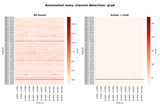mne.chpi.filter_chpi¶
- mne.chpi.filter_chpi(raw, include_line=True, t_step=0.01, t_window='auto', ext_order=1, allow_line_only=False, verbose=None)[source]¶
Remove cHPI and line noise from data.
Note
This function will only work properly if cHPI was on during the recording.
- Parameters
- rawinstance of
Raw Raw data with cHPI information. Must be preloaded. Operates in-place.
- include_linebool
If True, also filter line noise.
- t_step
float Time step to use for estimation, default is 0.01 (10 ms).
- t_window
float Time window to use to estimate the amplitudes, default is 0.2 (200 ms).
- ext_order
int The external order for SSS-like interfence suppression. The SSS bases are used as projection vectors during fitting.
Changed in version 0.20: Added
ext_order=1by default, which should improve detection of true HPI signals.- allow_line_onlybool
If True, allow filtering line noise only. The default is False, which only allows the function to run when cHPI information is present.
New in version 0.20.
- verbosebool |
str|int|None Control verbosity of the logging output. If
None, use the default verbosity level. See the logging documentation andmne.verbose()for details. Should only be passed as a keyword argument.
- rawinstance of
- Returns
- rawinstance of
Raw The raw data.
- rawinstance of
Notes
cHPI signals are in general not stationary, because head movements act like amplitude modulators on cHPI signals. Thus it is recommended to to use this procedure, which uses an iterative fitting method, to remove cHPI signals, as opposed to notch filtering.
New in version 0.12.
